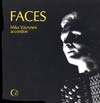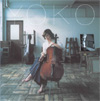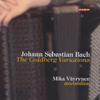 |
||||||||||||||||||||||
|
||||||||||||||||||||||
 |
|
|
|
Sincerely, |
| You were born in Helsinki. Was your family originally from there? | ||||||||||||||||||||||||||||||
| I'm not exactly
sure where my family was originally from. My Mother and Father were living
in Helsinki when I was born, however they divorced when I was just a baby. When I was about five or six years old, I moved away from Helsinki to Tampere to live with my Great Grandmother. So I was born in Helsinki, grew up in Tampere, and then after my schooling I returned to Helsinki. |
||||||||||||||||||||||||||||||
| How did you begin your music study and why did you choose the accordion? | ||||||||||||||||||||||||||||||
| I was living
with my Great Grandmother and her daughter, (the sister of my grandmother.)
I was living with these two ladies and it was the sister of my grandmother
who was playing the accordion. She had a little old Weltmeister instrument.
I have to say, I really didn't like it when I heard it, however one autumn it was raining and I had nothing to do, so I took the accordion and started to play it. Somehow I figured out how to play a waltz with both hands on the first day, and since that day I just continued you to play! |
||||||||||||||||||||||||||||||
| Was your family musical and did your parents play an important part in your early music education? | ||||||||||||||||||||||||||||||
| My family was
a very musical family and has been involved in music. My mother, who I
don't really know that well, was a professional musician, so there might
have been some musical genetics I suppose. However, where I grew up, there was no exposure to high perspectives of music or to classical music. It was quite old fashioned in fact, because my Great Grandmother was born in 1907, so I got the education from that time. |
||||||||||||||||||||||||||||||
| Who was your first accordion teacher and what other teachers have influenced you? | ||||||||||||||||||||||||||||||
| I started to
play by ear. I didn't have any knowledge about music, but I was able to
study from recordings that I had such as those of the Rhapsodies by Frosini.
Those days I recorded myself, so I have several examples of how I was playing when I was a child. I have to say when I listen to these recordings, I am quite surprised how I was playing in those days. They were really quite difficult pieces, but somehow I found almost all the correct notes, plus some extra ones as well! In particular, one accordionist called Tauno Jack was living in Helsinki, and somehow had some connections with my family. He sent me tapes (60 minute cassettes) which I studied by just listening to. Eventually a private accordion school was established in Tampere. It was the first school of its kind in the area. I was very fortunate that the two teachers were first generation academics, both young guys in their early twenties who had studied at the Conservatory in Jyväskylä. It was just by luck that I met the right people and the right time. They introduced me to what might now be considered the modern way of playing the accordion. In particular I really admired the man who taught me in the beginning, Tapani Luojus. He was almost like the missing father to me. He had the perfect psychology for children and probably because of his fantastic teaching, I did as well as I did in those days. It was just my good luck and he was the best teacher of my life. I think the first teacher is very important. |
||||||||||||||||||||||||||||||
| Tell us a little about your musical education that has taken you all the way to a Doctorate degree? | ||||||||||||||||||||||||||||||
| I was with Tapani
for my younger years. When I was about 11 or 12 years old, I started to
play repertoire like the Sonata No. 2 by Vladislav Zolotariew and Capriccio
by Albin Repnikov. He wanted to put me forward so passed me on to another
teacher called Vesa Vienola. At the same time I started to study at the
Tampere Conservatory and it was at that time that I was recognized as
having a special talent for music. Until that time I really didn't know
that all the other accordionists were not doing the same thing. When I was 13, I played in a local accordion concert. I played the Sonata No. 2 by Zolotariew and in the audience was the teacher from the Sibelius Academy who immediately recruited me to attend the Junior Academy. In those days it was still called The Department for Specially Gifted Children. I was 14 years old when I started the Junior Academy. In 1985 I began my studies at the soloist department of the Academy. In 1988, right after my military service, I spent one year at the Gustave Charpentier Conservatory in Paris, France studying with Prof. Max Bonnay. After returning from Paris, I continued my studies at the Sibelius Academy. After I graduated from there, I decided to take the post graduate studies and finally finished my Doctorate degree in 1997. To this day, I am still at the Sibelius Academy, where I am now a teacher. |
||||||||||||||||||||||||||||||
| Your concert career has been quite extraordinary. When was your first concert, and where have your concert tours taken you since then? | ||||||||||||||||||||||||||||||
| I gave my first
official full recital in 1985 in Tampere. I was still 17 years old, but
that was my first full recital. It was broadcast live on the radio, which
was quite extraordinary in those days. Since that recital, my concert career has developed slowly. Sometimes I had the feeling that it wasn't developing at all, but little by little I would do some more concerts per year. Its slow work, but now I have been playing concerts for almost 20 years. My concerts have taken me to many countries including Austria, Belgium, Ukraine, China, Croatia, Denmark, Finland, France, Germany, Iceland, Japan, Netherlands, Norway, Poland, Russia, Slovakia, Sweden, USA and Yugoslavia, I think in total until today, I have played in about 21 nations. |
||||||||||||||||||||||||||||||
| In addition to your vast international travel, your concerts have seen you appeared at some of the most famous concert halls in the world. Name some of your favorites. | ||||||||||||||||||||||||||||||
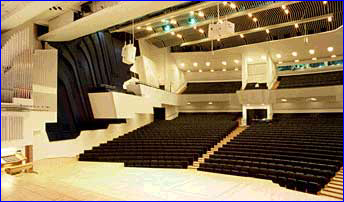 Some
of the best quality concert Halls have surely been in Japan. There are
also some very fine halls in Finland, and I have been lucky to have played
in them all. Some
of the best quality concert Halls have surely been in Japan. There are
also some very fine halls in Finland, and I have been lucky to have played
in them all. Mika has performed at the Salle Pleyel in Paris, Musashino Hall in Tokyo, Phoenix Hall in Osaka, Kiew Philharmony, The Gnessin Academy Hall in Moscow, De Ijsbreker in Amsterdam, Finlandia Hall (pictured above), Sibelius Academy, Tampere Hall and the Sibelius Hall all in Finland. |
||||||||||||||||||||||||||||||
| In the course of your concert career, have you had any unusual or humorous situations? | ||||||||||||||||||||||||||||||
| I did a lot
of small concerts when I was still younger. I was playing the Pictures
of an Exhibition by Modest Mussorgsky. During the movement called 'Old
Castle', an old lady fell asleep! It was the first time I had seen someone
fall asleep in one of my concerts. I guess this is the funniest thing that I have noticed. Many funny things have happened on tours during my days off, however nothing really humorous has happened in concert. Now however, he laughs, most people seem to stay awake in my concerts! |
||||||||||||||||||||||||||||||
| An important part of your concert career has also been your appearances with Symphony Orchestras. What has led to your appearances and who selects the repertoire? | ||||||||||||||||||||||||||||||
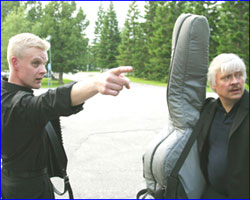 It
is time that leads to these performances. Unfortunately, the young accordionists
don't always understand that we cannot get everything today or even tomorrow.
They don't always understand that we have to also think about what is
coming in five or ten years. It
is time that leads to these performances. Unfortunately, the young accordionists
don't always understand that we cannot get everything today or even tomorrow.
They don't always understand that we have to also think about what is
coming in five or ten years. I decided to work and to practice very hard in succeeding in this very difficult profession. I am always working to increase my capability and increase my repertoire. My philosophy has always been that if I'm worthy, people will find or recognize it. Its the most natural way and other musicians begin to recognize that you might be an instrumentalist of the same quality or standard as they are. The same is true with the Conductors. One good concert might produce a new booking with the same conductor. The conductor's opinion of you is very important. They don't just see the concert, they see everything, including the rehearsal. Perhaps then there is a respect created from both sides, and so in the best cases it can create new opportunities. To me its just the result of time, and going slow... my method is 'slow.' I don't want or expect everything today or even tomorrow. I know that if I keep to my philosophy of practicing and working, and don't go cheap, then things will come sooner or later. As my reputation establishes, I don't have to make any telephone calls anymore. Of course there was a time that I had to make the telephone calls just to introduce myself and let the orchestras and conductors know that I existed, but now things really happen as the result of all that slow work. Mika has performed as a soloist with several major orchestras including the Helsinki Philharmonic Orchestra (Okko Kamu - Conductor) the Lahti Sinfonia (John Storgårds - Conductor) and the Turku Philharmonic Orchestra (Tonu Kaljuste - Conductor.) In addition, he has performed in many important Chamber Music Festivals including the world-famous Kuhmo Chamber Music, Naantali Music Festival, Lahti International Organ Festival, The Sibelius Festival in Loviisa, Tuusula-Lake Chamber Music, Korsholm Music Festival and others. |
||||||||||||||||||||||||||||||
| You are now teaching the accordion at the Sibelius Academy in Helsinki. How many students do you have? | ||||||||||||||||||||||||||||||
| Each year it changes a bit. I won't know the exact enrollments for next year for a few more weeks yet, but usually it is between five and nine students. | ||||||||||||||||||||||||||||||
| You once told me how important it is to you to offer guidance to your students while studying with you. Tell us a little bit about this. | ||||||||||||||||||||||||||||||
 Planning
for a student's future is done on a very individual basis. Some of the
students don't need so much planning as they will automatically find their
own way. However, some students might need some honest advice and discussion
about their true possibilities. It could be so, that a student is truly
looking in the wrong direction. For example, maybe a student wants to
be a concert artist, but it might be obvious that this is not a possibility.
However, that particular student might seem to have an exceptional pedagogical
ability, so my work is to go slowly and gently to that direction. Planning
for a student's future is done on a very individual basis. Some of the
students don't need so much planning as they will automatically find their
own way. However, some students might need some honest advice and discussion
about their true possibilities. It could be so, that a student is truly
looking in the wrong direction. For example, maybe a student wants to
be a concert artist, but it might be obvious that this is not a possibility.
However, that particular student might seem to have an exceptional pedagogical
ability, so my work is to go slowly and gently to that direction.Teaching itself is half teaching and the other half being a psychologist. I do think a lot about it, but on the other hand teaching is work, and so it has to be. I don't always take these things everyday to my home. When I am at work, I work very hard and think about everything. I even think about it to and from work, but once at home, I have to focus on other things, I have to cut it off. I still consider that I am teaching as a sideline. I consider myself a performing artist and so my first job is to practice, my second job is to perform and then teaching and the other things fall into place after that. |
||||||||||||||||||||||||||||||
| You are undoubtedly the most recorded accordion artists of today. When did you record you first CD? | ||||||||||||||||||||||||||||||
| It was quite
soon after winning the 1989 CIA Coupe Mondiale in Luzerne, Switzerland.
It was the next year I got my first opportunity to record my first CD.
which was great luck. Someone actually came to ask me to do it. I was very fortunate. After that it has happened like almost everything in my life - slowly. I have to consult with the recording companies to see if they want to record a project, but so far I have been able to record every project I was interest in. |
||||||||||||||||||||||||||||||
| Since then you have recorded 13 CD's on such labels as Finlandia Records/Warner Classics, JVC Victor Japan, ALBA, Naxos and CPO. How is the process initiated in terms of getting the CD Label to commit to the project? | ||||||||||||||||||||||||||||||
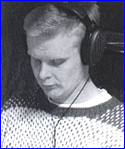 Each
Label seems to have a certain kind of philosophy of what they are doing.
One Label is more traditional whereas another Label can be a little more
avant-garde. The projects I have done so far, seem to have fit in quite
naturally with each Label's catalog. Each
Label seems to have a certain kind of philosophy of what they are doing.
One Label is more traditional whereas another Label can be a little more
avant-garde. The projects I have done so far, seem to have fit in quite
naturally with each Label's catalog.Nowadays I am quite familiar with the various Labels and what kind of profile that Label has. I understand what they are interested in and what they are not interested in, so its quite easy. I have not been met with any resistance to any of my projects, but again, it has been developing as has everything in my life... slowly! |
||||||||||||||||||||||||||||||
|
||||||||||||||||||||||||||||||
|
|
||||||||||||||||||||||||||||||

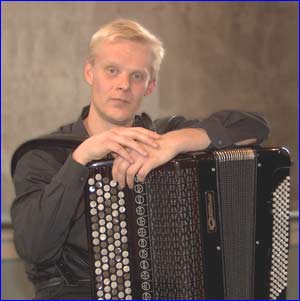 This
interview with Mika Väyrynen was conducted in Ikaalinen, Finland
on June 30, 2004.
This
interview with Mika Väyrynen was conducted in Ikaalinen, Finland
on June 30, 2004.
